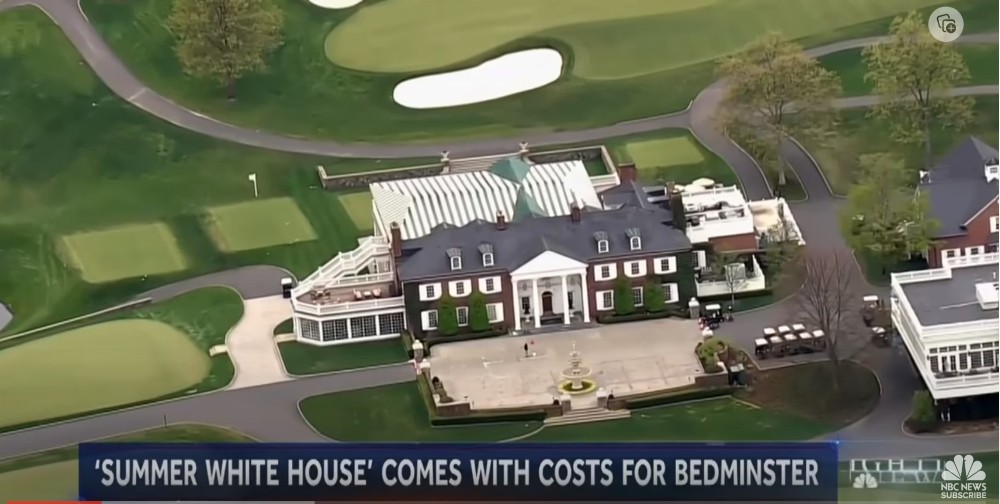Donald Trump and the legal investigation into his activities at his golf resort have put little Bedminster, New Jersey under a spotlight it would like to avoid. I grew up in the next town to Bedminster, so Trump’s 600-acre estate and Trump National Golf Course stir mixed memories. The area pretty much wished for the Trump Fate, and now it has come.

Somerset Hills, the rolling, mansion-dotted landscape of Bedminster and my pre-revolutionary hometown of Bernardsville (pop. 7,900), is 40 miles due west of Manhattan. After the Civil War, the area was discovered by wealthy, horse-keeping Manhattanites. In the time-honored pattern, they built summer cottages there and later turned them into Gatsby-like mansions.
Trump, unsurprisingly, bought from a failed tycoon the biggest mega-mansion in Bedminster (pop. 8,300), just west on twisty Highway 202 from Bernardsville. Then he built a 36-hole golf course (entrance fee: $150,000) and a gilded palace to entertain guests back in the days of his real estate deals, and later to hide and wave around some White House boxes. It’s also a wedding venue and party site.
The region was first settled in 1680. Its New England features, such as village greens, bespeak the days when the Boston-Philadelphia road passed nearby. Bernardsville, once called Vealtown, had the Bernardsville Mountain, where the rich folks lived and played. I went to Bernards High School, which drew middle-class, overwhelmingly white students from such towns as Bedminster, Far Hills, and Peapack-Gladstone (wealthy hamlets to the west). Rich kids, of course, avoided the public schools. My first newspaper job was at the Bernardsville News, published by a patrician named Courtland Parker, and still publishing today.
The region gradually attracted celebrities (Jackie O., Douglas Dillon, Brooke Astor, Tommy Dorsey, Bill Moyers) and later sprouted prominent headquarters (AT&T, Verizon) that crowded the narrow old streets with limousines and filled the air with executive helicopters. My family was a rarity (middle class), so I never really met folks up on “the hill.” The discovery of Somerset Hills by the wealthy (like the Long Island Hamptons today) was followed by a C-suite executive migration, since we were on the Gladstone branch (started in 1872) of the old Lackawanna Railroad. New York was reachable with just an hour’s worth of card games in the bar car.
My father, a mid-level executive at RCA, commuted on the Lackawanna to Harrison, N.J., just west of Manhattan. I would ride along with my mother to pick him up on the 6:12. The local high school was mediocre, though it had an excellent band where I played clarinet for Mr. Cotter. It was a good place to grow up in, very pretty and dotted with Revolutionary sites and ancient oak trees. It was like F. Scott Fitzgerald’s St. Paul, full of mysterious, big-lawn mansions and forbidden daughters.
If I didn’t get to socialize with the rich kids on the hill, I did make friends with the offspring of the servant class down in the valley. I once befriended the son of a kennel-keeper who was researching a New Yorker story on the wealthy set. One of my jobs at the newspaper was to gather social and fashion notes from gossipy ladies who went to the best parties and weddings. On my street, Old Fort Road, lived Meryl Streep, a fellow graduate of Bernards High, class of 1967, whom I never met.
New Jersey has long succumbed to negative stereotypes, but the Somerset Hills and the Raritan Valley were far from “Joisey.” The northwest corner of the Garden State is hilly, dotted with lakes, and has charming towns such as Mendham that invoke church-steepled villages in New England. This complex region never quite knew what it should be — New York exurb, corporate office park, remnant of early America, gilded Trumpian America, horse-country, churchy tax-averse Republican white enclaves that starved the schools. My parents finally gave up on it and moved away. Me too. Trump moved in.

A couple weeks ago, with a few hours to spare between a family visit in Connecticut and a trip home from Newark Airport, Lynn and I walked the Hoboken waterfront, speculating about the extent to which the new Seattle waterfront soon would or would not resemble it. To the south, the railroad terminal proudly proclaimed “Lackawanna Railroad,” and we both wondered, what the heck was that? Thanks for providing some context – and for the glimpse of what now seems like a simpler time in America (even if it didn’t seem simple at the time).
David Brewster and Donald Trump came (and went) from Bedminster, NJ. This story illuminates these newsworthy eastward precincts but offers interesting biographical details on both men. Good timing.
Enjoyed this remembrance, David, and sharing of your history. It seems that wherever Trump goes he has no sense of fit or proportion and so overwhelms all in his path.
Loved this piece, David.
This was a fun read Loved the “mysterious, big-lawn mansions and forbidden daughters” – it rather sums up the haves vs the have-nots-a-ton-of-money in white suburban enclaves of the era, though Old Fort Road looks about perfect. It certainly raised two hard working, creative makers of a rich cultural world for the rest of us.
A place that never seemed like home, to David’s older sister. Fun to read about now. Wished it was longer… Barbara de la Cuesta
Thank you for sharing, David. I could relate, somewhat, having grown up in Orange County CA. Politics of the 1950s was hard right. The John Birch-influenced Republican Party devoted itself to sniffing out Reds (before it became the semi-official GOP colors). Not just the “reds,” but anyone who was pinkish. Our haven for the elite was the Newport Beach yacht club and Balboa Island, home of their summer homes.
Very biased, but nicely written.